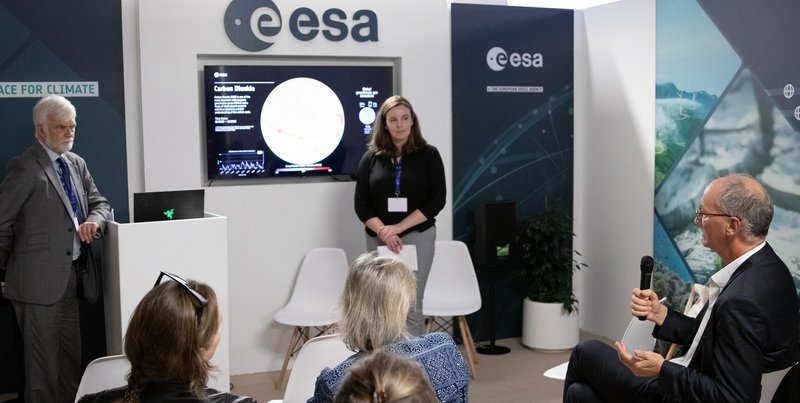4 december 2023
Harnessing Earth Observation for Climate Action
ESA in conversation Prof Jim Skea with IPCC Chair during the COP28 Earth Information day
To coincide with Earth Observation Day at #COP28 (4 December) Prof Jim Skea, the recently elected Chair of the Intergovernmental Panel on Climate Change (IPCC), provided his thoughts on the fundamental role of Earth Observation in informing climate policy and the evolving and growing potential of space-based observations to both support implementation of the Paris Agreement and inform the next IPCC reporting cycle to assess the state of the climate.
The significance of Earth Observations in IPCC reports
Prof Skea began by underlining the abundant use of EO across all IPCC reports, in particular its latest and Sixth Assessment on the current state of the climate using the best available science.
Here he highlighted the how EO provides the fundamental lines of evidence underpinning its main conclusions set out in its Working Group 1 report - hich focuses on the physical science basis of climate change - and serves the crucial role of filling data gaps left by in-situ observations and serves the crucial role of filling data gaps left by in-situ observations. He added that satellite data were key contributions to the Assessment's subsequent Working Group 2 and3 reports which focus on climate impacts, adaptation, and vulnerabilities and monitoring greenhouse gas emission inventories, respectively.

Where are we now? Key messages from the IPCC reports
The session highlighted core messages from the latest reports, including the alarming reality that the Earth has warmed by 1.1°C, and that many human-induced climate changes are unprecedented over hundreds to thousands of years. Climate change has already affected all inhabited regions of the world, from the poles to the ocean, from mountains to the tropics - with many of these changes observed from space for several decades.
Prof Skea however highlighted other, more positive trends where actions is helping to address the upward temperature trends identified by the IPCC. Renewable energy production for example are an area of growing success, with notable project implementation costs falling, which it is hoped will lead to an expansion of the green energy generation sector. Several countries also were achieving sustained emissions reductions, to contribute towards achieving the 2050 net zero goal.
Despite these positive strides in climate action however, greenhouse gas emissions are at historic highs, putting us on track for a 3°C temperature rise by the end of the century. Without immediate, deep, and sustained, limiting global temperatures to 1.5°C will be beyond reach, emphasising the gravity of the existential challenge at hand.
“IPCC has identified the need to achieve net zero global emissions if we are going to stop climate change, and this requires action on multiple fronts." Prof Jim Skea.What next for the IPCC?
While in its early stages, the IPCC Seventh Assessment Cycle (AR7) is poised for a significant impact. Prof Skea provided insights, mentioning an IPCC Plenary in January to determine the workplan of the cycle. Notably, a Special Report on Cities is in the pipeline, featuring an unprecedented 1000 nominations for its author selection.
Engagement opportunities for EO communities
Addressing the involvement of ESA and its EO communities, Prof Skea outlined several avenues, like publishing findings in high-level journals and enhancing ESA's open-access databases. ESA was encouraged to engage through its IPCC Observer status, by nominating authors, participating in scoping meetings, and contributing to the approval sessions for report outlines. The discussion also emphasised the role of future ESA missions in supporting the Paris Agreement goals and the specific contributions of each working group in the IPCC process.
“Please continue to develop future missions in ways that support the Paris Agreement goals – monitoring source and sinks, land use changes, disaster impacts, greater resolution observations.” Prof Jim Skea
Fostering collaboration to push for action
The session concluded with an engaged discussion that integrated pivotal themes like emission verification and monitoring, and the imperative to fill geographical data gaps to support climate action, particularly in regions like sub-Saharan Africa. Prof Skea noted that there is untapped potential in terms of emissions inventories and mitigation progress.
As the world grapples with an escalating climate crisis, this session at COP28 underscored the necessity for collaborative efforts to steer climate action forward. The role of EO remains indispensable in ensuring a just and sustainable future for all.
Earth Information Day
Professor Skea's comments come following the Earth Information Day plenary session, where he took part in a formal dialogue to exchange information on the state of the global climate system and developments in systematic observation. He was joined by other notable participants from organisations including WMO, CEOS, UNESCO as well as Simonetta Cheli, ESA's director for Earth Observation.
This plenary session was organised by the Subsidiary Body for Scientific and Technological Advice (SBSTA), a permanent bodies of the UNFCCC and provides timely information and advice on scientific and technological matters as they relate to the Convention, its Kyoto Protocol and the Paris Agreement.

